The Peace of Callias is a purported peace treaty established around 449 BC between the Delian League and Persia, ending the Greco-Persian Wars. The peace was agreed as the first compromise treaty between Achaemenid Persia and a Greek city.
Callias was an Ancient Greek statesman, soldier and diplomat, active in 5th century BC. He is commonly known as Callias II to distinguish him from his grandfather, Callias I, and from his grandson, Callias III, who apparently squandered the family's fortune.
Callias was an ancient Athenian aristocrat and political figure. He was the son of Hipponicus and an unnamed woman, an Alcmaeonid and the third member of one of the most distinguished Athenian families to bear the name of Callias. He was regarded as infamous for his extravagance and profligacy.
Callias of Chalcis, son of Mnesarchus, together with his brother Taurosthenes, succeeded his father as tyrants of Chalcis. Callias formed an alliance with Philip of Macedon against Plutarch, tyrant of Eretria, with the view of extending his authority over the whole of Euboea, a design which, according to Aeschines, he disguised as a plan for uniting in one league the states of the island and establishing a general Euboean congress based at Chalcis.
The name Catuaba is used for the infusions of the bark of a number of trees native to Brazil. The most widely used barks are derived from the trees Trichilia catigua and Erythroxylum vaccinifolium. Other catuaba preparations use the bark of trees from the following genera or families: Anemopaegma, Ilex, Micropholis, Phyllanthus, Secondatia, Tetragastris and species from the Myrtaceae.

Ypióca Group is a Brazilian traditional manufacturer of cachaça located in the state of Ceará. The Ypióca Group consists of seven companies which include mineral water production and farming.

Catuabines are a group of tropane alkaloids, isolated from Erythroxylum vaccinifolium, which are used in the preparation of the drug Catuaba. While catuabine A, B and C were isolated and characterized by Graf and Lude, catuabine D was recently isolated by Zanolari et al. The catuabines are not known to have any physiological effects, this is in contrast to cocaine, which is an active constituent of another species, Erythroxylum coca.
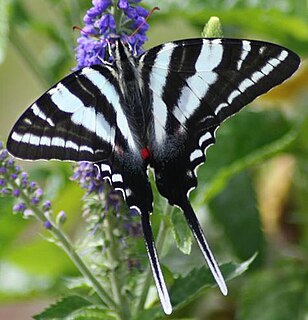
Eurytides is a genus of butterflies in the family Papilionidae, found in North, Central, and South America.
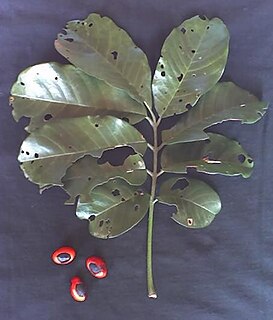
Trichilia is a flowering plant genus in the family Meliaceae. These plants are particularly diverse in sub-Saharan Africa and tropical South America.
Callias, sometimes called by the nickname Schoenion (Σχοινίων), was a poet of the Old Comedy, not to be confused with the three Athenian aristocrats named Callias, the last of which, Callias III, appears in Plato's Protagoras.
Hermogenes was an ancient Athenian philosopher best remembered as a close friend of Socrates as depicted by Plato and Xenophon.
Callias was the head of a wealthy Athenian family.
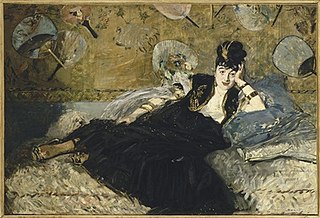
Anne-Marie Gaillard, known as Nina de Villard de Callias, Nina de Callias or Nina de Villard, was a French composer, pianist, writer, and salon hostess.
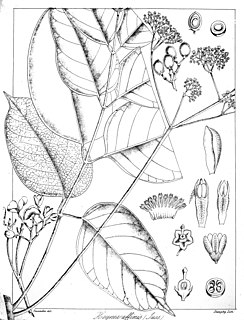
Trichilia catigua is a flowering plant species in the genus Trichilia.

Erebia callias, the Colorado alpine, is a member of the Satyridae subfamily of the Nymphalidae butterflies. It is found in alpine areas of Wyoming and Colorado in the U.S. Rocky Mountains as well as various mountain ranges in eastern Asia.
Calliini is a tribe of longhorn beetles of the subfamily Lamiinae.
Catuaba sanguinoloenta is a species of beetle in the family Cerambycidae, and the only species in the genus Catuaba. It was described by Martins and Galileo in 2003.
Callia is a genus of longhorn beetles of the subfamily Lamiinae.
Hydroptila callia is a species in the family Hydroptilidae ("microcaddisflies"), in the order Trichoptera ("caddisflies"). Hydroptila callia is found in North America.
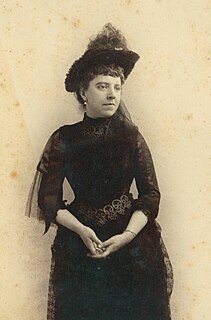
Nancy Fish Barnum Callias D'Orengiani, Baroness was an English socialite who was the second wife of P. T. Barnum. The daughter of a successful English cotton mill owner, she started a relationship with Barnum, who was 40 years her senior. After the death of Barnum's first wife in 1873, they married the following year in both London and New York City. After his death in 1891, Barnum left Fish a large annuity, making her a wealthy widow.







